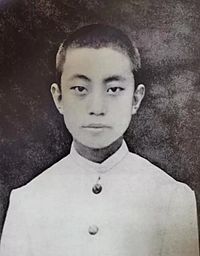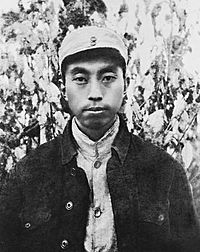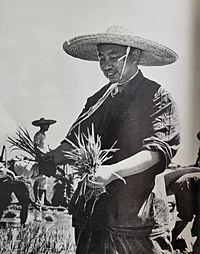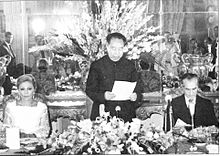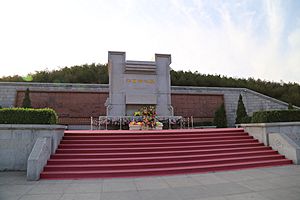Hua Guofeng facts for kids
Quick facts for kids
Hua Guofeng
|
|||||||||||||||||||||
|---|---|---|---|---|---|---|---|---|---|---|---|---|---|---|---|---|---|---|---|---|---|
| 华国锋 | |||||||||||||||||||||
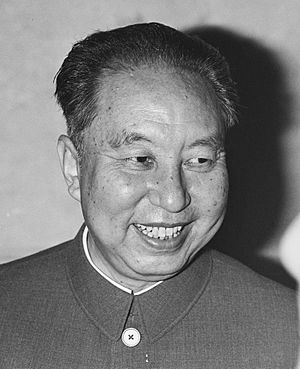
Hua Guofeng during a visit to the Hôtel de Ville in Paris, 1979
|
|||||||||||||||||||||
| Chairman of the Communist Party of China | |||||||||||||||||||||
| In office 7 October 1976 – 28 June 1981 |
|||||||||||||||||||||
| Deputy | Ye Jianying | ||||||||||||||||||||
| Preceded by | Mao Zedong | ||||||||||||||||||||
| Succeeded by | Hu Yaobang | ||||||||||||||||||||
| Chairman of the Central Military Commission | |||||||||||||||||||||
| In office 7 October 1976 – 28 June 1981 |
|||||||||||||||||||||
| Preceded by | Mao Zedong | ||||||||||||||||||||
| Succeeded by | Deng Xiaoping | ||||||||||||||||||||
| 2nd Premier of the People's Republic of China | |||||||||||||||||||||
| In office 4 February 1976 – 10 September 1980 |
|||||||||||||||||||||
| President | post abolished Soong Ching-ling Ye Jianying (de jure head of state) |
||||||||||||||||||||
| Vice Premier | Deng Xiaoping | ||||||||||||||||||||
| Preceded by | Zhou Enlai | ||||||||||||||||||||
| Succeeded by | Zhao Ziyang | ||||||||||||||||||||
| First Vice Chairman of the Chinese Communist Party | |||||||||||||||||||||
| In office 6 April 1976 – 6 October 1976 |
|||||||||||||||||||||
| Chairman | Mao Zedong | ||||||||||||||||||||
| Preceded by | Zhou Enlai | ||||||||||||||||||||
| Succeeded by | Ye Jianying | ||||||||||||||||||||
| Vice Chairman of the Chinese Communist Party | |||||||||||||||||||||
| In office 28 June 1981 – 12 September 1982 |
|||||||||||||||||||||
| Chairman | Hu Yaobang | ||||||||||||||||||||
| Personal details | |||||||||||||||||||||
| Born |
Su Zhu
16 February 1921 Jiaocheng County, Shanxi, Republic of China |
||||||||||||||||||||
| Died | 20 August 2008 (aged 87) Beijing, People’s Republic of China |
||||||||||||||||||||
| Political party | Chinese Communist Party (1938–2002) | ||||||||||||||||||||
| Spouse |
Han Zhijun
(m. 1949) |
||||||||||||||||||||
| Children | 4 | ||||||||||||||||||||
| Chinese name | |||||||||||||||||||||
| Simplified Chinese | 华国锋 | ||||||||||||||||||||
| Traditional Chinese | 華國鋒 | ||||||||||||||||||||
|
|||||||||||||||||||||
| Su Zhu | |||||||||||||||||||||
| Simplified Chinese | 苏铸 | ||||||||||||||||||||
| Traditional Chinese | 蘇鑄 | ||||||||||||||||||||
|
|||||||||||||||||||||
|
Central institution membership
1976–1982: Member, 10th, 11th Politburo
1969–2002: Member, 9th, 10th, 11th, 12th, 13th, 14th, 15th Central Committee Other offices held
1981–1982: Vice Chairman, CCP
1977–1980: President, Central Party School 1976: First Vice Chairman, CCP 1975–1977: Minister, Public Security 1970–1976: Secretary, Hunan Party Committee 1970–1976: Chairman, Hunan Revolutionary Committee the People's Republic of China |
|||||||||||||||||||||
Hua Guofeng (born Su Zhu; 16 February 1921 – 20 August 2008) was an important Chinese politician. He served as the leader of the Chinese Communist Party and the head of the government, known as the Premier of China.
Hua was chosen by Mao Zedong to be his successor. After Mao and Premier Zhou Enlai passed away, Hua took on the top jobs in the government, the party, and the military. However, other party leaders gradually removed him from power between 1978 and 1981. After this, he mostly stayed out of the public eye in politics. He remained a member of the Central Committee until 2002.
Hua was born and grew up in Jiaocheng County, Shanxi province. He joined the Chinese Communist Party (CCP) in 1938. He fought as a guerrilla soldier in both the Second Sino–Japanese War and the Chinese Civil War. In 1948, when the Communists were winning the civil war, Hua was sent to Hunan province. He became the Party Secretary of Xiangtan, which included Mao's hometown.
Hua was a well-liked local leader. He became the Party Secretary of Hunan during the Cultural Revolution. In the early 1970s, he moved to national politics. He took control of the Ministry of Public Security in 1973. In 1975, Hua became Vice Premier. After Zhou Enlai died, Mao made Hua the Chinese Premier. This put him in charge of government work. He also became the First Vice Chairman of the Communist Party, making him Mao's chosen successor.
On 6 October 1976, soon after Mao's death, Hua arrested the "Gang of Four". This group of powerful leaders had caused many problems during the Cultural Revolution. Hua had help from Mao's security chief, Wang Dongxing, and other important leaders. After this, Hua became the Party Chairman and the Chairman of the Central Military Commission. He was the only leader to hold all three top positions at once.
Hua changed some policies from the Cultural Revolution. He stopped the constant political campaigns. However, he still believed in a government-controlled economy and followed Mao's ideas. Between 1978 and 1981, a group of older party leaders, led by Deng Xiaoping, removed Hua from his top leadership roles. Hua slowly disappeared from the political scene. But he always believed that Mao's ideas were correct.
Contents
Early Life and Rise to Power
Hua was born in Jiaocheng County, Shanxi. He was the fourth son in his family. His father passed away when Hua was seven years old. He studied at the Jiaocheng County Commercial School. In 1938, during the Second Sino–Japanese War, he joined the CCP.
Like many Communists at the time, he changed his name. His new name, Huá Guófēng, meant "Chinese Anti-Japanese Aggression National Salvation Vanguard." He served as a soldier for 12 years. In 1947, during the Chinese Civil War, he became the propaganda chief for the Jiaocheng County Party Committee.
In 1948, Hua moved to Hunan province with the victorious army. He stayed there until 1971. In August 1949, he became the Party Secretary for Xiangyin County. This was just before the People's Republic of China was founded. In 1952, he became the secretary of Xiangtan Special District. This area included Mao's hometown, Shaoshan. Hua built a memorial hall for Mao there. When Mao visited in 1959, he was impressed by Hua. Mao first met Hua in 1955 and liked his simple nature.
Hua gained more power in Hunan. He became Vice Governor in 1958. He attended an important party meeting in 1959. He wrote reports that supported Mao's policies. Hua's influence grew during the Cultural Revolution. He supported the movement and led it in Hunan. In 1967, he helped set up the local Revolutionary Committee. He became its Deputy Chairman. In December 1970, he was elected Chairman of this committee. He also became the First Secretary of the CCP Hunan Committee.
He became a full member of the 9th Central Committee in 1969.
Becoming a National Leader
In 1971, Hua was called to Beijing. He worked for Premier Zhou Enlai's government office. He only stayed for a few months before returning to Hunan. Later that year, he was chosen to investigate the "Lin Biao Affair." This showed that Mao trusted him greatly.
Hua was re-elected to the 10th Central Committee in 1973. He also became a member of the Politburo, a very powerful group. In the same year, Zhou Enlai put him in charge of developing agriculture.
In 1973, Mao made Hua the Minister of Public Security and Vice Premier. This gave him control over the police and security forces. Hua's growing importance was clear when he gave a speech about modernizing agriculture. This speech matched Zhou Enlai's ideas.
Zhou Enlai died on 8 January 1976. Mao Zedong then named Hua as the acting Premier. At the same time, the "Gang of Four" used the media to criticize Deng Xiaoping. However, people loved Zhou Enlai more than the Gang of Four expected. This led to the Tiananmen Incident. People protested against the removal of wreaths honoring Zhou. Hua gave speeches criticizing Deng Xiaoping, which Mao approved.
During the 1976 Tiananmen Incident, many people protested. Vehicles were burned, and offices were damaged. Deng Xiaoping was blamed for causing the protests. He lost all his party and government jobs. Soon after, Hua became the First Vice Chairman of the CCP Central Committee and Premier.
After the Tangshan Earthquake in July, Hua visited the damaged area. He helped lead the relief efforts.
Removing the Gang of Four
Mao died on 9 September 1976. Hua, as the second-in-command and Premier, led the national events to honor Mao. He was the main speaker at the memorial in Tiananmen Square. At that time, the most powerful group was the Politburo Standing Committee. It included Hua, Ye Jianying, Zhang Chunqiao, and Wang Hongwen. Zhang and Wang were part of the "Gang of Four."
Hua knew that after Mao's death, he and the Gang of Four would struggle for power. He believed that if he didn't act, the Gang might try to remove him first. Hua talked with Ye Jianying about the Gang of Four. Ye was also unhappy with the Gang. So, they quickly agreed to act against them.
Hua had the important support of Mao's security chief, Wang Dongxing. Wang commanded an elite security unit. Other key leaders also supported Hua. These included Vice Premier Li Xiannian and General Chen Xilian. They decided to use force to remove the Gang.
The members of the Gang were arrested on 6 October, just after midnight. Hua had called Zhang Chunqiao, Wang Hongwen, and Yao Wenyuan to a meeting. They thought they were going to discuss Mao's writings. But they were arrested as they entered the meeting at Huairen Hall. Hua himself told them why they were being arrested. He said they were doing "anti-party" actions and trying to "take power." Jiang Qing and Mao Yuanxin were arrested at their homes.
A special team took over the party's main propaganda offices. Another group went to Shanghai, which was the Gang's main power base. The next day, at a Politburo meeting, Hua Guofeng took on the roles of Chairman of the CCP Central Committee and the Central Military Commission. He also remained Premier. This made him the commander-in-chief of the People's Liberation Army.
As Party Chairman and Premier
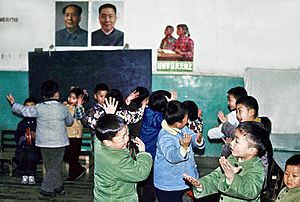
During his time in power (October 1976 to December 1978), Hua quickly removed the Gang of Four. This marked the end of the Cultural Revolution. After the Gang of Four were arrested, Hua, Marshal Ye Jianying, and Li Xiannian began to restore power to Deng Xiaoping. They also worked to remove the Gang's influence from the political system.
Hua's plans for the economy and politics involved bringing back Soviet-style industrial planning. This was similar to how China was run before the Great Leap Forward. However, Deng Xiaoping's supporters wanted a more market-based economy.
This disagreement was settled in Deng's favor in December 1978. This time is seen as the start of China's economic reforms. Hua also tried to increase his own importance. In 1978, all party meetings had to display portraits of Mao and Hua side-by-side. All schools also had to hang Hua's picture next to Mao's. Hua even changed the Chinese national anthem to include Mao Zedong and the Chinese Communist Party. These new lyrics were later removed.
Hua continued to use terms from the Cultural Revolution. But he also criticized some parts of it, like education reform. He blamed the Gang of Four for these problems. State media called him "the wise leader."
In February 1978, the party approved a new state constitution. Hua was very involved in writing it. This document tried to bring back some laws and plans from China's earlier constitution. But it still mentioned "continuous revolution." This constitution was replaced just four years later. Hua and other party leaders also planned a big ten-year economic project. It focused on heavy industry. But it was quickly replaced by a cheaper five-year plan. This new plan focused on light industry and consumer goods.
In October 1979, Hua went on a tour of Europe. This was the first time a Chinese leader had done this since 1949. He visited West Germany and France. On 28 October, Hua visited the United Kingdom. He met with British Prime Minister Margaret Thatcher. They had friendly talks and discussed the future of Hong Kong. Hong Kong was a British territory at the time.
Chairman Hua visited a railway center in Derby to see new train developments. He also went to a farm in Oxfordshire and visited Oxford University.
Hua was one of the last foreign leaders to visit Mohammad Reza Pahlavi, the Shah of Iran. The Shah was overthrown in 1979.
At a key party meeting in 1978, Deng Xiaoping became the main leader of China. His ideas for economic reform were adopted. Hua Guofeng was criticized for holding too many top jobs at once. These were Chairman of the Central Committee, Chairman of the Central Military Commission, and Premier. Between 1980 and 1981, these three jobs were given to three different people. However, this system was later brought back by Jiang Zemin.
Later Life and Passing
As Deng Xiaoping gained more control, Hua was criticized for his "Two Whatevers" policy. This policy meant "uphold whatever policy decisions Chairman Mao made, and unswervingly follow whatever instructions Chairman Mao gave." By January 1979, state media stopped calling him "the wise leader."
He was replaced as Premier by Zhao Ziyang in 1980. Hu Yaobang replaced him as Party Chairman. Deng himself replaced Hua as chairman of the Central Military Commission in 1981. Hua admitted his "Two Whatevers" policy was a mistake. Both Zhao and Hu were supporters of Deng and believed in economic reform.
Hua Guofeng was moved to a lower position as junior Vice Chairman. When this job was removed in 1982, he became an ordinary member of the Central Committee. He held this position until 2002, even after he was past the retirement age.
After Hua lost power in 1980–81, the party officially said he did good work by removing the Gang of Four. But they also said he made "serious errors" afterward.
Hua's removal was important for two reasons. First, it showed that official titles were not always the most important thing in the Chinese Communist Party. Even though Hua was the official leader, he could not defeat Deng Xiaoping. Second, Hua's removal showed a new policy. Disgraced party members would lose their jobs, but they would not be jailed or hurt.
After the 16th Party Congress in November 2002, Hua officially lost his seat on the Central Committee. It was reported that he retired because of his age and health. However, he was invited to the 17th Party Congress in 2007 as a special guest. He also appeared at a ceremony in December 2007 to celebrate Mao Zedong's birthday.
Hua stayed away from active politics. His main hobby was growing grapes. He kept up with news by reading many newspapers. Hua's health got worse in 2008. He was hospitalized for kidney and heart problems. He passed away in Beijing on 20 August 2008. His death happened during the Beijing Olympics. So, state media did not give it much attention.
His funeral was held on 30 August. All members of the Politburo Standing Committee attended. Former President Jiang Zemin and former Premier Zhu Rongji were also there.
Hua Guofeng's Legacy
Hua's legacy is often remembered for his "Two Whatevers" policy. This meant following all of Mao's decisions and instructions.
However, some historians argue that this idea is overemphasized. They say that honoring Mao right after his death was common. Even Chen Yun, who later became more powerful than Hua, also supported the "Two Whatevers."
Hua's changes to economic policies were similar to Deng's reform ideas from 1975. Hua made national economic development a top priority. He wanted to "free up productive forces." He combined Soviet-style industrial growth with opening up to the capitalist world. Under his leadership, China created its first Special Economic Zone. He also worked hard to attract foreign investment. Hua encouraged local economic policies that mixed government planning with some market freedom.
Hua removed the strict controls over culture and education that the Gang of Four had put in place. This led to more varied art and literature. Hua also brought back the loyalty of party members and intellectuals. Many of them had been pushed aside during the Cultural Revolution. This made the party stronger and helped bring stability to the country.
Family Life
Hua married Han Zhijun in January 1949. They had four children. All their children use the surname "Su," which was Hua's birth name. Their first son, Su Hua, was an Air Force officer. Their second son, Su Bin, was an army officer. Their older daughter, Su Ling, works for the Civil Aviation Administration of China. Their younger daughter, Su Li, works for the State Council.
See also
 In Spanish: Hua Guofeng para niños
In Spanish: Hua Guofeng para niños
- Politics of the People's Republic of China
- History of the People's Republic of China (1976–89)
- History of Communist Party of China
 | Anna J. Cooper |
 | Mary McLeod Bethune |
 | Lillie Mae Bradford |


